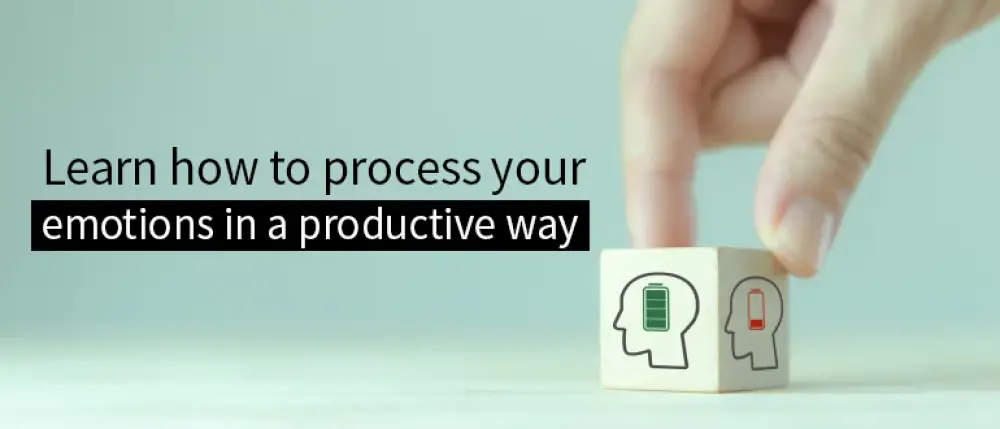Humans experience different kinds of emotions like joy, excitement, sadness or anger. Some emotions like sadness, anger or anxiety are not easy to express and make us uncomfortable. Such emotions that do not find an outlet are called unprocessed emotions and can cause serious mental health issues. In this blog, we will understand what does it mean to process emotions and discuss simple strategies to process emotions.
What Does it Mean to Process Emotions?
Emotion is an energy in motion that prompts you to take action. Emotions are reactions triggered by events or thoughts. The purpose of emotions is to help you identify your needs and goals. If these needs and goals are not met, you experience a negative or unhealthy emotion. When unhealthy emotions are suppressed and not addressed, they are bottled up making you anxious.
Processing emotion refers to facing the emotion instead of pushing it aside. When you suppress your emotions, you miss out on the message these emotions are trying to give; it affects your mental well-being leading to an emotional outburst eventually. Your judgment is also affected by your emotions if left unprocessed. Recognising uncomfortable emotions and expressing them timely can help you overcome them without affecting your mental and physical well-being.
How to Process Emotions in a Healthy Way?
Not knowing what to do when you experience an uncomfortable emotion is the biggest struggle for anyone. Hence, before knowing the steps to process emotions, let’s know 4 stages of emotional processing.
Recognise Your Emotion
Be aware of your emotions without labelling it as good or bad. Recognise it as an experience to understand yourself better. It does not define you, it is just an experience need to be observed.
Allow Yourself to Feel the Emotion
Let the emotion move through you so that you can feel it and do what needs to be done like a movement, a cry or a scream. This step will help you release the emotion.
Identify the Cause of Your Emotion
Identify what caused this emotional experience. The cause can be anything like a trigger, unfulfilled need, certain behaviour pattern or a violation of boundaries.
Validate the Emotion
Once you identify the reason behind an emotion, you can better cope with it. When you validate and accept your emotions, you can let them go and become more self-aware.
7 Effective Strategies to Help You Process Emotions
Here are some simple and effective strategies to help you process your emotions.
Maintain a Journal
Maintaining a journal is the best way of processing feelings and emotions. When you read your written expression of emotions, you can understand and control your emotions. You can note down your symptoms and the reasons on a daily basis and can identify repetitive patterns.
Talk to a Therapist
Processing emotions in therapy is an effective strategy as a therapy session provides a safe space to identify, express and understand your emotions. A therapist helps you regulate your emotions and teaches you tools to better cope with suppressed emotions.
Practice Meditation
If you want to know how to process and release emotionsthen practice meditation. It is the best tool to clear your mind. It allows you to let go of any thoughts you have in mind and enables you to experience your emotions fully.
Listen to Music
Music is an effective tool to feel your emotions. To learn how to process feelings, play music that matches your emotions. There is music for every emotion, joy, sadness, excitement, anger etc.
Do Exercise
Exercising and intense workouts help you know how to process difficult emotions like heartbreak or anger. Exercising improves resilience, and reduces stress and depression.
Distract Yourself
Engage in a hobby, read a book, watch TV or go out with friends to distract yourself and forget about your emotions for some time. Anyone asking, how do you process emotions should understand that not paying any attention to your emotions is sometimes good as it allows them to pass on their own.
Emotional Rehabilitation
It is a kind of therapy that helps you strengthen your emotional ability while recovering from a chronic medical condition, acute injury or addiction. It helps you accept the change in your life or the loss that you are experiencing and achieve emotional stages of sobriety during the recovery process.
Stay Calm!
No matter how strongly you feel an emotion, remember that it does not have the power to hurt you unless you allow it to. Learning how to process my emotions or how to process my feelings is crucial to help you better deal with your emotions and maintain your emotional balance in these stressful times. Not to forget serious mental illnesses may triggered by emotional trauma such as death of a near one can lead to anxiety, depression or post-traumatic stress disorder.
No doubt availing treatment for any mental issues caused by emotional traumas can be daunting. Thankfully, with a comprehensive health insurance coverage you can cover those expenses. One of our health insurance plans, Care Freedom offers coverage for anxiety issues, while our Care Supreme plan offers OPD coverage for 4 psychiatrist consultations. You can make the best out of their 21700 cashless healthcare providers when it comes to availing healthcare facilities.
Disclaimer: The above information is for reference purposes only. Kindly consult your general physician for verified medical advice. The health insurance benefits are subject to policy terms and conditions. Refer to your policy documents for more information.
